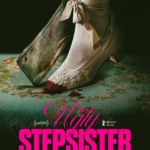A gay man makes a deal with his lesbian friend: a green-card marriage for him, in exchange for in vitro fertilization treatments for her. Plans evolve as Min’s grandmother surprises them with a Korean wedding banquet.
Chuck says:
Compromises abound in Andrew Ahn’s “The Wedding Banquet,” a surprisingly, even-keeled look at love in the modern age. The decisions of the four principals are not just dictated by their hearts, but by financial concerns, societal issues and staid tradition. An update of the Ang Lee’s 1993, Ahn’s movie benefits greatly from, of all things, a subtle approach. Emotional histrionics are eschewed in favor of a sincerity which grounds the story and breeds a sense of empathy for all involved.
Angela (Kelly Marie Tran) and Lee (Lily Gladstone) have a secure relationship; however, it is being tested in unexpected ways. Eager to become parents, their two efforts at IVF have failed. Lee, who was the carry their child, is older and can only attempt the procedure once more. Though risky, the greater concern is the expense, the couple not having the money to try again. Still, there’s never a worry the unmarried pair will stay together.
On the other hand, Chris (Bowen Yang) and Min (Han Gi-Chan) are on shakier ground. Together for five years, they’ve fallen into a rut. So, when Min proposes and is met with uncertainty on Chris’ part, their relationship is suddenly on shaky ground. Adding to Min’s woes is the fact that Ja-Young (Youn Yuh-jung), his grandmother, expects him to take over the multinational corporation his grandfather has built. If he refuses, he will be forced to return to Korea when his green card expires.
The solution that would seemingly solve all their problems wouldn’t be out of place in a 1930’s screwball comedy. Min suggests he and Angela get married so he can stay in the country. In exchange, he will give her and Lee the money for another IVF treatment. Simple enough…that is, until Ja-Young gets wind of it and comes to the States to make sure the wedding ceremony is done according to Korean tradition.
Thanks to Ahn’s brisk pacing, this premise is dispensed with in the first half hour. The script by James Schamus and Ahn takes a deep dive into how this unorthodox situation affects all involved. The fake nuptials prompt the quartet of friends to reevaluate not only their relationships but also what each wants out of their lives. Rash decisions are made, impulsive acts result in unforeseen ramifications and much soul-searching results in some radical decisions.
What’s most satisfying about the film is the time that’s taken to develop its characters. None of what the four principals goes through seems superfluous or manipulative. Their responses to the situations they find themselves in develop in a logical manner, their reasoning sound and feelings genuine. The honesty with which all of this is rendered gives the film an emotional resonance that’s unexpected and welcome.
Adding to this is the examination of Ja-Young and May Chen’s (Joan Chen) responses to this unique social compact. While the former is intent on having her culture’s customs used in the wedding ceremony, she also reveals a sense of practicality towards it that’s surprising, that is until we learn of her past. As for May Chen, Angela’s mother, her constant advocating for her daughter isn’t born from any deep-seated conviction to defend her daughter’s sexuality but rather her narcissistic desire to be seen as a “good mother.” She too undergoes a shift in perspective that proves surprising.
While “Banquet” is being pushed as a rom com, it’s so much more. Its well-rounded characters serving as viewer surrogates, it powerfully reminds us that often the compromises we make aren’t to benefit someone else, but rather to keep us from embracing the happiness we deserve.
3 Stars




